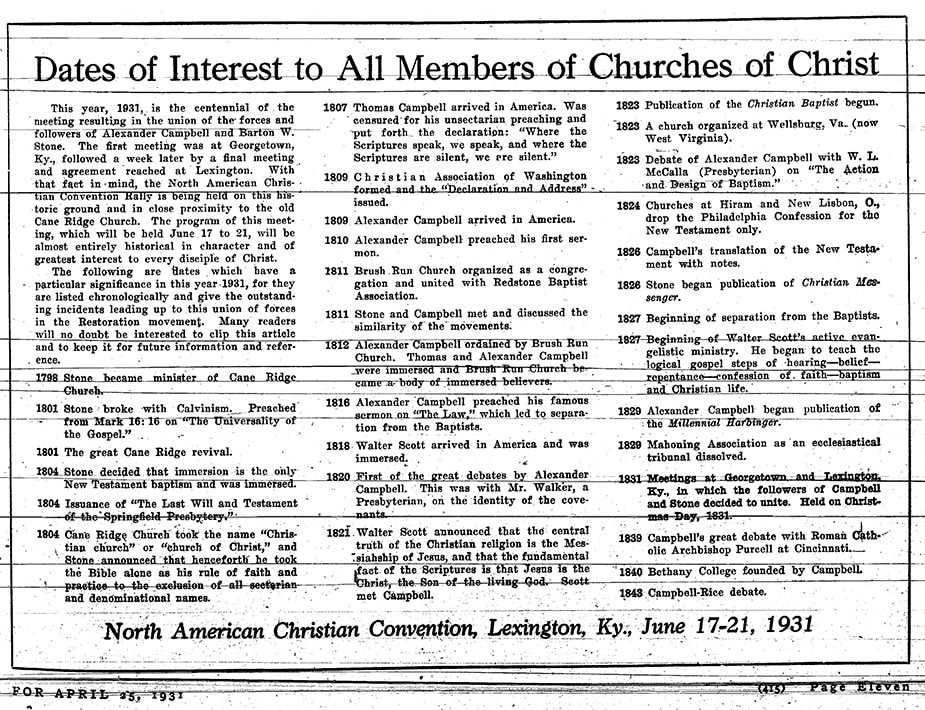In preparation for the 1931 North American Christian Convention, slated for June 17 to 21 of that year in Lexington, Ky., Christian Standard published a list of important dates in Restoration Movement history. (Strangely, the clip-worthy article listed events that occurred only from 1798 to 1843.)
– – –
Dates of Interest to All Members of Churches of Christ
April 25, 1931; p. 11
This year, 1931, is the centennial of the meeting resulting in the union of the forces and followers of Alexander Campbell and Barton W. Stone. The first meeting was at Georgetown, Ky., followed a week later by a final meeting and agreement reached at Lexington. With that fact in mind, the North American Christian Convention Rally is being held on this historic ground and in close proximity to the old Cane Ridge Church. The program of this meeting, which will be held June 17 to 21, will be almost entirely historical in character and of greatest interest to every disciple of Christ.
The following are dates which have a particular significance in this year 1931, for they are listed chronologically and give the outstanding incidents leading up to this union of forces in the Restoration movement. Many readers will no doubt be interested to clip this article and to keep it for future information and references.
1798 Stone became minister of Cane Ridge Church.
1801 Stone broke with Calvinism. Preached from Mark 16:16 on “The Universality of the Gospel.”
1801 The great Cane Ridge revival.
1804 Issuance of “The Last Will and Testament of the Springfield Presbytery.”
1804 Cane Ridge Church took the name “Christian church” or “church of Christ,” and Stone announced that henceforth he took the Bible alone as his rule of faith and practice to the exclusion of all sectarian and denominational names.
1807 Thomas Campbell arrived in America. Was censured for his unsectarian preaching and put forth the declaration: “Where the Scriptures speak, we speak, and where the Scriptures are silent, we are silent.”
1809 Christian Association of Washington formed and the “Declaration and Address” issued.
1809 Alexander Campbell arrived in America.
1810 Alexander Campbell preached his first sermon.
1811 Brush Run Church organized as a congregation and united with Redstone Baptist Association.
1811 Stone and Campbell met and discussed the similarity of the movements.
1812 Alexander Campbell ordained by Brush Run Church. Thomas and Alexander Campbell were immersed and Brush Run Church became a body of immersed believers.
1816 Alexander Campbell preached his famous sermon on “The Law,” which led to separation from the Baptists.
1818 Walter Scott arrived in America and was immersed.
1820 First of the great debates by Alexander Campbell. This was with Mr. Walker, a Presbyterian, on the identity of the covenants.
1821 Walter Scott announced that the central truth of the Christian religion is the Messiahship of Jesus, and that the fundamental fact of the Scriptures is that Jesus is the Christ, the Son of the living God. Scott met Campbell.
1823 Publication of the Christian Baptist begun.
1823 A church organized at Wellsburg, Va. (now West Virginia)
1823 Debate of Alexander Campbell with W.L. McCalla (Presbyterian) on “The Action and Design of Baptism.”
1824 Churches at Hiram and New Lisbon, O., drop the Philadelphia Confession for the New Testament only.
1826 Campbell’s translation of the New Testament with notes.
1826 Stone began publication of the Christian Messenger.
1827 Beginning of separation from the Baptists.
1827 Beginning of Walter Scott’s active evangelistic ministry. He began to teach the logical gospel steps of hearing—belief—repentance—confession of faith—baptism and Christian life.
1829 Alexander Campbell began publication of the Millennial Harbinger.
1829 Mahoning Association as an ecclesiastical tribunal dissolved.
1831 Meetings at Georgetown and Lexington, Ky., in which the followers of Campbell and Stone decided to unite. Held on Christmas Day, 1831.
1839 Campbell’s great debate with Roman Catholic Archbishop Purcell at Cincinnati.
1840 Bethany College founded by Campbell.
1843 Campbell-Rice debate.
(At the bottom of this listing of dates, across three columns, was this headline)
North American Christian Convention, Lexington, Ky., June 17-21, 1931


0 Comments